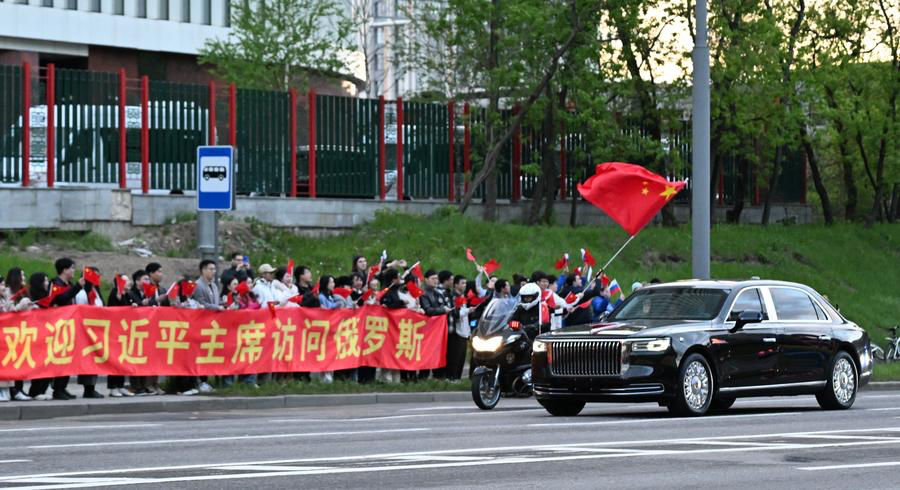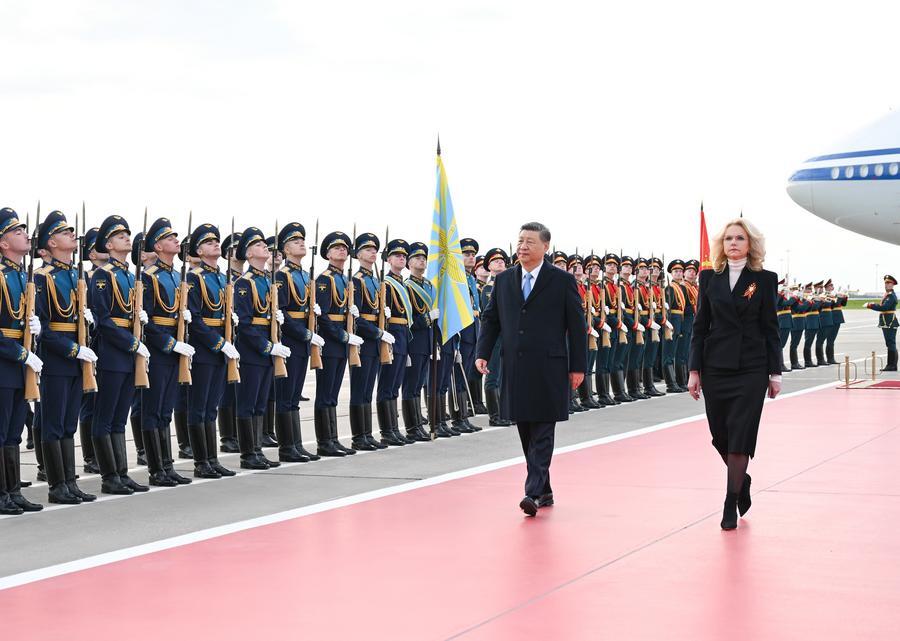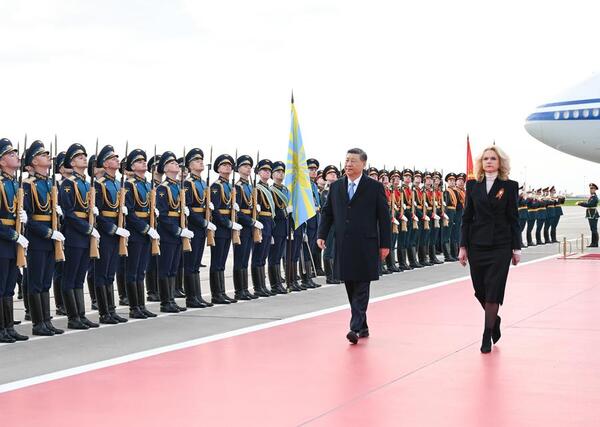Chinese President Xi Jinping called on Wednesday for concerted efforts to defend the legacy of World War II victory, at a time when the specter of hegemonic and power politics continues to loom large over the world.
Xi was invited upon his arrival in Moscow for a state visit to Russia and to participate in the celebrations marking the 80th anniversary of the Soviet Union's victory in the Great Patriotic War.
In a written statement issued upon his arrival, Xi said that China and Russia will work together to safeguard the victory of World War II and resolutely oppose hegemonic and power politics.
He explained that China and Russia, two major countries in the world and permanent members of the UN Security Council, will cooperate to firmly safeguard the UN-centered international order based on international law, practice genuine multilateralism, and promote the building of a more just and equitable global governance system.
Xi's visit comes at the invitation of Russian President Vladimir Putin, and marks his 11th visit to Russia since becoming President of China.
During his stay, Xi is expected to engage in in-depth discussions with Putin on bilateral relations and cooperation, as well as major international and regional issues of common concern.
According to the Chinese Foreign Ministry, Xi's attendance at the celebrations marking the 80th anniversary of the Soviet Union's victory in the Great Patriotic War is an important part of his visit. This will be Xi's second time attending Russia's Victory Day celebrations on May 9 as Chinese president.
A massive military parade is scheduled to take place in Moscow's Red Square tomorrow (Friday). Flags bearing the word "Victory" fluttered along the streets of Moscow, and billboards and decorated windows depicting the history of the Soviet Union's Great Patriotic War lined the roads.
On the night of May 8, 1945, Germany signed the surrender document in Karlshorst, Berlin, bringing World War II to an end in Europe. However, due to the time difference, Moscow had already entered the war on May 9, the date that Russia and the former Soviet Union celebrate as Victory Day.
At the same time, China's major military campaign against Japan, the Battle of Western Hunan, was reaching its decisive stage. Japan's formal surrender aboard the battleship USS Missouri in Tokyo Bay on September 2, 1945, brought World War II to an end.
 In this photo taken on May 7, 2025, Chinese President Xi Jinping arrives in Moscow, Russia. (Xinhua)
In this photo taken on May 7, 2025, Chinese President Xi Jinping arrives in Moscow, Russia. (Xinhua)
In a signed article published in the Russian newspaper Gazette prior to his arrival, Xi urged the international community to adhere to a correct historical perspective on World War II.
"China and the Soviet Union were the main theaters of that war in Asia and Europe, respectively," Xi wrote. "The two countries formed the mainstays in the struggle against Japanese militarism and German Nazism, and made decisive contributions to the victory of the World Anti-Fascist War."
He added that any attempt to distort the historical truth of World War II, deny the results of victory, or distort the historical contributions of China and the Soviet Union is doomed to failure.
The year 2025 marks the 80th anniversary of the founding of the United Nations, a body that emerged from the ashes of World War II. The UN Charter begins with a solemn pledge: "To protect succeeding generations from the scourge of war."
In light of the severe adverse conditions facing the world today due to practices of unilateralism, hegemony, bullying, and coercion, Xi stressed the importance of multilateralism.
"The more turbulent and complex the international situation becomes, the more we need to uphold and defend the authority of the United Nations," he wrote in his signed article.
"Establishing an international system with the UN at its core was not an easy task, and all countries in the world must vigorously maintain it," said Ekaterina Zaklyazminskaya, a leading researcher at the Institute of Modern China and Asia of the Russian Academy of Sciences.
"Russia and China support true multilateralism, which is crucial at this time," she added.
Alexei Rodionov, professor of Chinese studies at Saint Petersburg State University, said the world is irreversibly moving toward a multipolar system, with Russia and China playing key roles in this transformation.
He added that China maintains a balanced position on international issues, which is why more countries now view it as a key reference in global diplomacy and politics.



Share your opinion
Xi calls for protecting the legacy of World War II victory